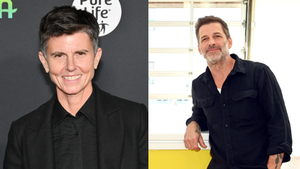Treatment GuideJust DiagnosedSex & DatingAfrican AmericanStigmaAsk the HIV DocPrEP En EspañolNewsVoicesPrint IssueVideoOut 100
CONTACTCAREER OPPORTUNITIESADVERTISE WITH USPRIVACY POLICYPRIVACY PREFERENCESTERMS OF USELEGAL NOTICE
© 2025 Pride Publishing Inc.
All Rights reserved
All Rights reserved
By continuing to use our site, you agree to our Privacy Policy and Terms of Use.
It may be no coincidence that while Washington, D.C., continues to reel from news of its "generalized and severe" HIV epidemic, membership in D.C. Young Poz Socials, a networking and support group, has swelled to more than 700 gay men. A devastating 120-page report by the district's AIDS office has revealed that at least 3% of Washingtonians older than 12 -- more than 15,000 city residents -- are HIV-positive. Actual infection rates may be as high as 5%, some experts note, and that puts D.C. on par with some hard-hit African nations. Despite having the highest HIV prevalence of any locale in the country, stigma and discrimination run so high in D.C. that many HIVers there remain essentially closeted and isolated, afraid to reveal their serostatus to even family members and close friends. The group is focused specifically on breaking that isolation by connecting HIV-positive gay men with each other for support, friendship, and camaraderie through social activities that include bowling nights, white-water rafting trips, and jaunts to Atlantic City, N.J. Shawn Henderson, who has led the group since 2004, says it is vital for him and his peers, since living and working in the nation's capital poses distinct challenges for gay men. "Everybody's connected politically," says 35-year-old Henderson, who is working for the Department of Homeland Security while pursuing studies in religion. "It's a very conservative town." This makes the disclosure to others of one's living with HIV -- even to other gay men -- "like having to come out all over again," says Henderson, whose own grandparents severed their relationship with him upon hearing that he is HIV-positive. Edward Cooper, who is 36 years old and a member of the group since 2004, says he finds comfort in socializing with people who also experience the same issues he deals with on a daily basis. As an example, he points to the ability to discuss with other group members the side effects of his anti-HIV medications. These sorts of connections and conversations allow young HIV-positive men to truly be themselves, says Cooper, perhaps "even more so than in their own network of friends." For Henderson, the most meaningful moments with the social group aren't planned. Tearing up, he shares that at almost every gathering, a newly diagnosed -- and scared -- young man will break down crying, thinking that he "won't be able to continue." Henderson adds, "Within 10 minutes he's surrounded by other members and laughing."
From our Sponsors
Most Popular
“So much life to live”: Eric Nieves on thriving with HIV
September 03 2025 11:37 AM
Thanks to U=U, HIV-positive people can live long, happy, healthy lives
July 25 2025 2:37 PM
The Talk: Beyond the exam room
August 13 2025 3:15 PM
BREAKING: Supreme Court rules to save free access to preventive care, including PrEP
June 27 2025 10:32 AM
Messenger RNA could be the key to an HIV vaccine — but government cuts pose a threat
August 20 2025 8:02 AM
“I felt like a butterfly”: Niko Flowers on reclaiming life with HIV
July 23 2025 12:22 PM
Dancer. Healer. Survivor. DéShaun Armbrister is all of the above
July 02 2025 8:23 PM
The Talk: Starting the conversation
July 25 2025 4:47 PM
The lab coat just got queer
August 21 2025 10:00 AM
Plus: Featured Video
Latest Stories
HIV-positive men stage 'Kiss-In' protest at U.S.-Mexico border
December 01 2025 12:56 PM
What the AIDS crisis stole from Black gay men
December 01 2025 6:00 AM
Amazing People of 2025: Javier Muñoz
October 17 2025 7:35 PM
It’s National PrEP Day! Learn the latest about HIV prevention
October 10 2025 9:00 AM
“I am the steward of my ship”: John Gibson rewrites his HIV narrative
September 16 2025 2:56 PM
The Talk: Owning your voice
August 25 2025 8:16 PM
The Talk: Navigating your treatment
August 01 2025 6:02 PM
How the Black AIDS Institute continues to fill in the gaps
July 25 2025 1:06 PM
1985: the year the AIDS crisis finally broke through the silence
June 26 2025 11:24 AM
VIDEO: A man living with HIV discusses his journey to fatherhood
June 10 2025 4:58 PM
Trump admin guts $258 million in funding for HIV vaccine research
June 03 2025 3:47 PM
Grindr is reminding us why jockstraps are so sexy and iconic
May 02 2025 5:36 PM
HRC holds 'die-in' to protest Trump health care cuts
April 28 2025 2:11 PM
Two right-wing Supreme Court justices signal they may uphold access to PrEP and more
April 21 2025 4:10 PM
500,000 Children at Risk: PEPFAR Funding Crisis
April 08 2025 3:51 PM
Broadway's best raise over $1 million for LGBTQ+ and HIV causes
April 03 2025 7:15 PM
The Talk Season 5 premieres this spring with HIV guidance for the newly diagnosed
March 26 2025 1:00 PM








































































